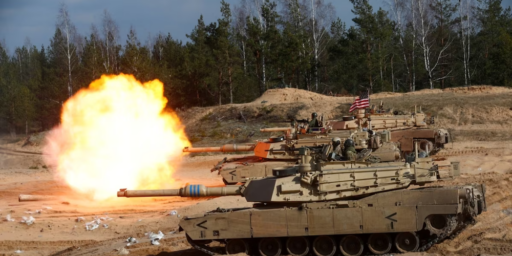WHY ARABS LOSE WARS
Isabel Vincent purports to answer that question but doesn’t. Instead, she engages in ridiculously gross generalities and explains why poorly-equipped armies using outdated tactics lose to modern ones. Which, of course, everyone already knows.
The rest of it is rather strained:
Arab armies have tried repeatedly to defeat Israel since its creation more than 50 years ago, but have regularly failed, even at times when the Israeli forces were smaller and seemingly weaker.
A coalition of Arab armies that had massed its forces for nearly a month along Israel’s borders. Six years later, in the Golan Heights, Israeli armed forces, which are largely made up of reserves and are much smaller than most Arab armies, held back a Syrian attack of some 900 tanks with 177 tanks. Israel also shot down dozens of Syrian planes without any losses over Lebanon in June, 1982, after Israeli drone aircraft cracked the Syrian tracking system
One of the exceptions to the rule of Arabic defeats in modern history has been the Jordanian army in the 1940s. The Arab Legion, a small faction of the Jordanian armed forces, scored huge military victories against Israel in 1948. The unit was trained by legendary British commander Sir John Bagot Glubb.
There hasn’t been a significant Arab-Israeli war in 30 years. We might as well be talking about the Stone Age. And, again, as we have learned again and again and again, smaller armies that are well-equipped and well-trained outperform larger armies using outdated equipment and tactics. There is nothing Arab-specific about that.
“The leadership is lousy. . . .The leaders live in luxury and treat their men like dirt. You have officers living in places like Saddam’s palaces and some of the troops begging in the streets.”
But almost all armies, including most Western armies, are that way, although not to the same degree. Only the most modern militaries–including that of the US–have the ethic of the officers and men living under the same conditions, eating the same food, etc. And that’s a phenomenon of the last 40 years or so at most even in the US. (And the Navy still hasn’t caught on to this.)
Arab armies are particularly weak in air combat, defence analysts say. For instance, during the eight-year Iran-Iraq War, Iraqi pilots refused to conduct low-level attacks against Iranian troops on the ground, preferring to drop their bombs from the safety of 30,000 feet — a situation that made the Iraqi air force virtually useless.
Well, gee, that’s how NATO fought the Kosovo campaign. The problem is that the Arab air forces are very poorly trained and lack the sophisticated systems multipliers that allow us to operate that way.
Interestingly, the article doesn’t mention one significant issue in Arab culture that is rather unique: The unwillingness to get one’s hands dirty. In most Arab societies, almost all the real work–including white collar jobs like computer programming–is hired out to foreigners. Training for combat, even such comparatively glorious jobs as being a fighter pilot, is considered beneath the dignity of Arabs. Which is why, even when they buy sophisticated Western fighters and other equipment, they don’t employ them very effectively.
(Hat tip: Volokh)






After 22 years I can say that if my leader (who is suspose to have more training, education, information, etc.) is sitting with me in a shit-hole, instead of the officer’s mess when there is no requirement to be with me,I wouldn’t consider him fit to lead either.
There isn’t such a thing as officer’s mess anymore in the US Army. There hasn’t been in a few decades. In the field, Army officers eat what the troops eat–just last. I know the Navy is still very segregated by rank; I’m not quite sure what the policies of the Air Force and Marines are in this matter. Presumably, Marines aboard ship follow Navy customs. I suspect they are more like the Army when in the field.
—